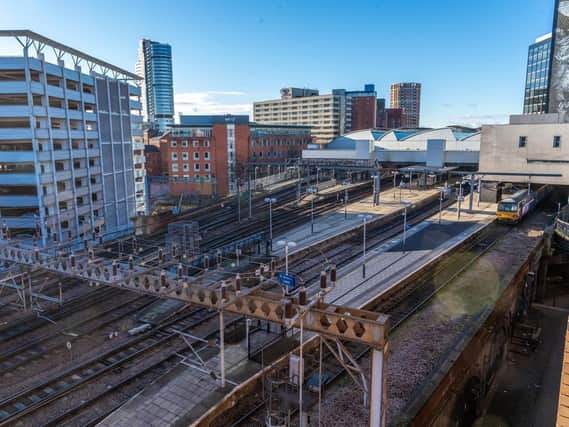Reservation-only trains and no evening travel: The future of rail in Yorkshire post-lockdown


Transport for the North's Rail North Committee, which will convene on Wednesday in a virtual meeting live-streamed to the public, has set out guidelines for rail operators such as Northern and Transpennine Express on how to run trains in the era of social distancing and reduced demand.
With staffing levels still expected to be affected by vulnerable workers remaining in isolation, daytime services for key workers will remain a priority, although the frequency and number of trains will start to gradually increase. There will be few evening services to allow resources to be concentrated on commuter trains.
Advertisement
Hide AdAdvertisement
Hide AdLeisure travel will still be discouraged and timetables will not prioritise these destinations.
The report also raises the possibility of rail operators introducing reservation-only trains to limit the number of passengers using each service.
In the document - titled Covid-19 Recovery - the committee admits that the rail network will need to be prepared for an 'unknown' level of usage in the coming months.
Since the lockdown timetable was introduced on March 23, passenger numbers have dropped to around five per cent of normal levels.
Advertisement
Hide AdAdvertisement
Hide AdTranspennine Express has been transitioned onto a government-supported Emergency Measures Agreement to protect the operator from financial pressure, and the same principles will apply to Northern, although they have already been under government control since March, when Arriva lost the franchise.
When the report was prepared, the rail industry had been advised to prepare for an increase in services from May 18, and they are still awaiting further advice from the government.
Northern will postpone the introduction of their planned May 2020 timetable update, and instead retain the December 2019 timetable as the basis for their immediate post-lockdown operations.
The report states: "The timetable uplift will, for the northern operators, mean effectively the existing key worker timetables with significant enhancements. TPE is focussing on ‘travel to work’ rather than leisure passengers and where possible, will seek to increase day-time frequency and reduce evening frequency to manage the number of staff required to run the services.
Advertisement
Hide AdAdvertisement
Hide Ad"Northern is planning for the uplift based on its pre-existing December 2019 timetable. This allows them to use fleet and available staff more effectively which helps to achieve a more stable performance. Its previously-planned May 2020 timetable had few significant uplifts planned, meaning this approach fits with the rest of the planned uplifts in regional service patterns.
"Both plans are shaped by train crew resource and targeted at areas where there is predicted to be increased demand as and when restrictions change. Existing social distancing measures greatly limit capacity on trains and, by extension at stations. It also impacts operators and services differently given the different service types, train and station layouts, the ability or not to limit reservations etc. With current levels of demand this has not been an issue, but any demand increase will require additional consideration.
"The industry has been actively working through the issues around social distancing and PPE. Consideration is being given to the likely increased demand from passengers when lockdown measures are eased and arrangements for social distancing, e.g. reservation-only trains for some operators, to manage current and increased passenger numbers against social distancing restrictions. It is acknowledged by the industry that high-volume commuter flows, such as those that are provided to and between our towns and cities by both Northern and TPE, with traditionally sharp peak demands, especially in the morning peak, provide a particular challenge. It is recognised there will be a need for robust messaging which is likely to need to be adapted to address the different challenges faced by train operators."
The introduction of new rolling stock could also be delayed by the crisis, as there are fewer staff which has impacted on plans for driver training and route familiarisation.
Advertisement
Hide AdAdvertisement
Hide AdThe report concludes by acknowledging that the coronavirus lockdown is likely to have long-term effects on passenger behaviour and on sections of the economy that depend on rail access.
Evening trains are not likely to be reinstated until the hospitality sector has re-opened, and it is thought 'probable' that demand from office workers will reduce as more home working is permitted.
"Future phases of the crisis are likely to be more difficult to manage for the rail industry and the travelling public. We don't yet know the speed or phasing it will be possible to return to normal activities. We don't yet know how passenger sentiment will alter travel behaviour. We don't yet know the full impact of the pandemic on all sectors of the economy, or how long these might last."
"It is probable that the legacy of successful home working will endure, so we can expect to see rail demand remain below pre-pandemic levels - possibly for a significant period of time.
Advertisement
Hide AdAdvertisement
Hide Ad"There will be significant pressure to control and minimise costs in the light of reduced revenue streams, possibly exacerbated by lower passenger inclination to travel in crowded environments. Recovery from the pandemic in the rail sector will be a balance between supply and demand, affordability and economic stimulus. Transport for the North will play a role in advising on the priorities for services in the region, and on assessing the role rail is playing in rebuilding confidence in the economy. We will also be able to help shape how services and markets are best served as the opportunities offered by these extraordinary circumstances emerge. For example, it may be sensible (while demand is lower) to focus on train performance, rather than capacity. Over time, the behavioural changes resulting from the pandemic may provide an opportunity to prepare and deliver a better rail service for the future."
The report's recommendations will be discussed at Wednesday's Rail North Committee meeting.